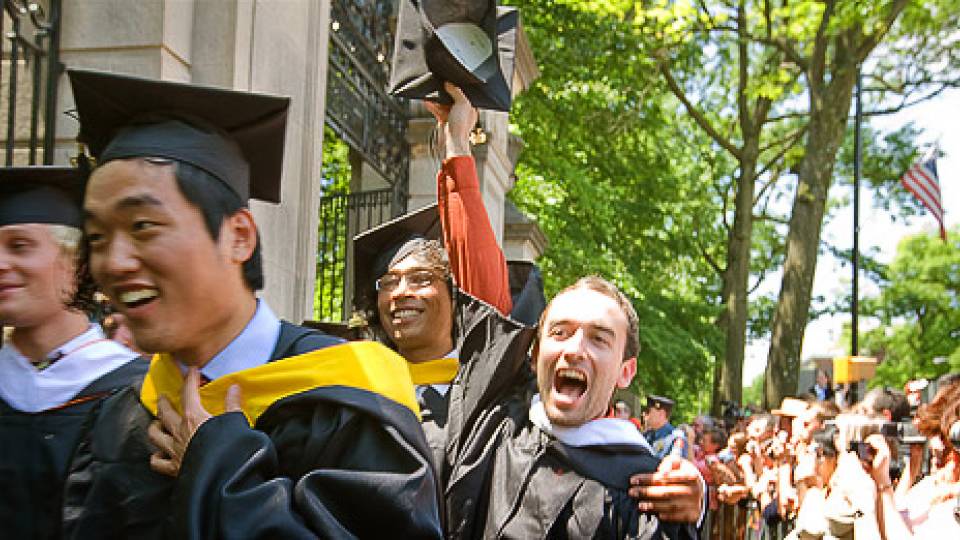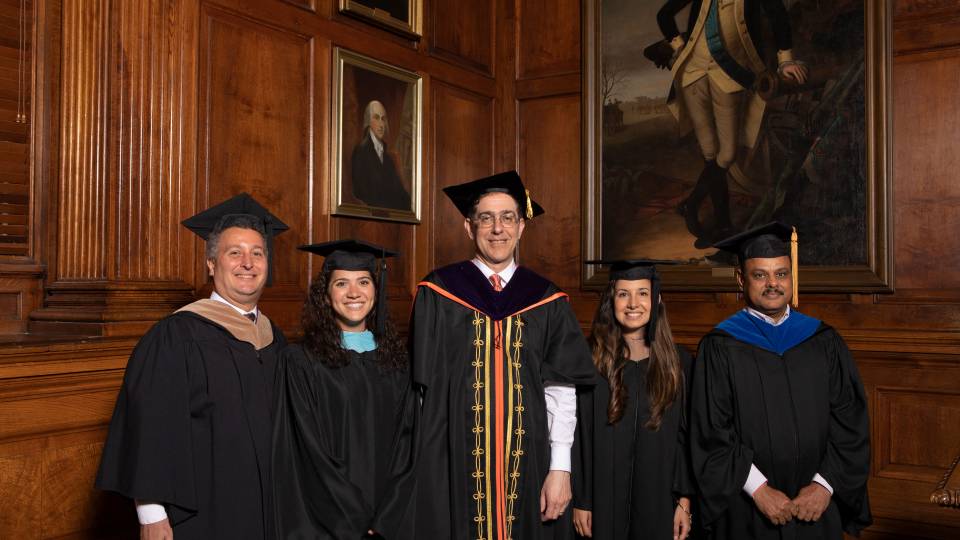Princeton University will honor four outstanding New Jersey secondary school teachers at its 2009 Commencement on Tuesday, June 2.
This year's honorees are James Danch, Colonia High School, Colonia; Katherine O'Neil, East Brook Middle School, Paramus; Martin Shields, Pascack Hills High School, Montvale; and Rebecca Strum, Bergen County Academies, Hackensack.
The teachers were selected for the award from 81 nominations from public and private schools around the state. Each teacher will receive $5,000 as well as $3,000 for his or her school library.
"This year's awardees offer us a splendid portrait of excellence in teaching. The most important ingredient for student success is a good teacher, and these four teachers epitomize the very best of the profession," said John Webb, director of Princeton's Program in Teacher Preparation, which administers the awards. "They are deeply passionate about what they do each day, in some cases even after decades in the classroom. They sincerely care about young people, and their students return that affection with their trust and admiration, the greatest of all tributes."
The staff of the Program in Teacher Preparation selected 10 finalists, each of whom was visited at work by an observer. Finalists were selected by a committee chaired by Dean of the College Nancy Malkiel and including Webb, two Princeton professors and two external education professionals.
Princeton has honored secondary school teachers since 1959. The University received an anonymous gift from an alumnus to establish the program.
James Danch
Whether he's snorkeling for salamanders or jetting across the country for speaking engagements, James Danch is inspiring students and teachers to take a more imaginative approach to science learning and education.
Danch, who began at Colonia High School in 1985, teaches physics, science research and science investigation methods. His class schedule includes courses for both advanced students as well as those with special needs, demonstrating his talent in explaining both complex and fundamental principles. These lessons often take Danch and his students into the field, to the Pine Barrens and beyond.
For instance, in a science methods course for special-needs students, Danch was teaching a lesson about how shape influences the speed at which something falls. His approach: have students time different-shaped objects as they were dropped one at a time from the local fire department's 90-foot-high hook-and-ladder truck basket.
"Mr. Danch actively engages students in the process of learning through his well-constructed lessons, stimulating class presentations and process-oriented, hands-on learning investigations," said Dorothy Ponte, head of the science department at Colonia. "He imparts critical science knowledge and skills to students of all learning abilities (as supported by standardized test data and competitive science awards)."
One of his most popular and effective innovations has been the science research course, in which students identify a real-world problem, develop a hypothesis and perform experiments to test their theories. Former student Kimberly Boyko said Danch and his course inspired her to become a science teacher.
"In the classroom, Mr. Danch was kind and approachable, very well educated in his subject matter yet able to bring the material down to the students' level, [and] had a great sense of humor that he incorporated into his lectures and assignments," she said. "Mr. Danch never succumbed to the rote-memorization way of instructing, and somehow managed to entertain us while he taught."
Danch said that an early experience working with special education students led him to focus his teaching on the joy of scientific discovery.
"I have learned that true scientific study is not about facts and figures recited by honor students, but rather the opportunity for all students to discover something as of yet unknown not just to them, but to the world," he said.
Some of Danch's other activities cited in his nomination include developing curricula on both the local and national level, leading science education training for other teachers and performing with the school band, orchestra, chorus or any other group when needed.
Danch received a B.S. in environmental science from Rutgers in 1984 and an M.S. in biology from Georgian Court University in 2000.
Katherine O'Neil
Katherine O'Neil's career path has been a winding road from actress to teacher, and she now combines her talents as an eighth-grade reading and language arts instructor and director of the annual school musical.
After many years pursuing her passion in performing arts, O'Neil began working as a substitute teacher in 1999 and became a language arts teacher in 2001. Since 2003, she has been in her current position at East Brook Middle School. She works hard to earn the trust of her students while challenging them to grow as critical thinkers, skillful writers and lifelong readers, according to those who nominated her for the award.
For example, she begins each class with a discussion of how the students' day has unfolded, creating an open and supportive atmosphere in her classes, said student Lucas Riccardi.
"I love how personal her class is; Ms. O'Neil makes sure that all of her kids get the attention they need to succeed," he said. "Ms. O'Neil's class has a reputation for being difficult, but all admit that they walk out of her classroom every day with new ways of questioning and thinking outside the box."
For the musical, O'Neil spends four days a week after school working with more than 100 students on the set, props, acting, singing and dancing, putting on a first-rate show, said her former principal, Willis Bott. Her ability to connect to students led him to frequently observe her classes for pleasure.
"Her enthusiasm for learning, for seeing her students grow, and for making the difficult task of writing so much easier for all of her students was evident in every visit," Bott said. "She understands early adolescent learners, communicates effectively with them, and students respect and admire their talented teacher."
In addition to leading training sessions and serving on curriculum committees, O'Neil has implemented several programs that encourage reading. She has started a literary journal of student works and a reading initiative, the Author Study Program, that has mobilized the local community. Students are required to select an author and read four of his or her books. They must discuss those books with an adult partner before completing a written assignment on what they have learned. One fellow teacher said that she often encounters students reading before class, in class, at lunch and even while walking in the hallways.
"We have become a jubilant, multi-generational community of readers," O'Neil said. "If there is one area in my years of teaching of which I am most proud, it is this blending of generations engaged in the act of reading literature."
O'Neil double majored in theater and elementary education at Northwestern University, graduating in 1977.
Martin Shields
By directing his passion for biology to his teaching and his everyday life, Martin Shields is a role model to students and his fellow teachers.
Shields has been a high school teacher since 1993 and has taught biology at Pascack Hills High School since 2002. Additionally, he is an adviser for the school's environmental club, a mentor to new and student teachers and a leader in curriculum development, locally and nationally. Shields has published multiple books on science teaching, and he has garnered numerous awards for his efforts.
In addition to being self-motivated to learn new teaching techniques and embracing the use of new technologies in the classroom, he also inspires students to learn with hands-on experiences -- test scores in the Advanced Placement Biology class have risen sharply since he took over the course, said principal Sarah Van Gunten.
"Whether Mr. Shields is working with highly motivated students or those who struggle to learn, he is able to tap each student's potential, strengths and interests, and lead students to success in his classroom -- and a sense of personal accomplishment in their particular abilities," she said.
Students relate to Shields' authentic interest in biology and the environment. He drives a hybrid car to school, has solar panels on his home and organizes recycling efforts at Pascack Hills. An ornithologist, Shields also takes students on nearby birding expeditions.
Jeffrey Vinokur, a former student now majoring in biochemistry in college, said that his interest in biology developed as a result of lab experiments, course discussions on bioethics and extracurricular chats about genetics with Shields.
"Instead of just memorizing biological nomenclature, as I had anticipated, we discussed biology in order to achieve an understanding and appreciation for it," Vinokur said. "Because learning continued outside the classroom and beyond the test, Mr. Shields truly challenges and inspires his students to go above and beyond."
Shields said that he learned early that if he respected and cared for his students, they would respect his desire to focus on learning.
"Whatever the ability level of the class, I strive for an environment of high-energy learning that is heavily seasoned with humor, excitement and relevance to the students' lives," he said.
Shields received his B.A. in biology from Hobart College in 1985 and an M.S. for teachers of biological sciences from the University of Montana in 1991.
Rebecca Strum
Starting from scratch, Rebecca Strum has created an extraordinary performing arts program at Bergen County Academies and endeared herself to colleagues and students in the process.
Strum has been teaching since 1973, and began as an English teacher at Bergen County Academies in 1998. In 2002, she became the performing arts coordinator, writing the curriculum for the new theater arts program and building it into a powerhouse in a school focused heavily on math, science and technology. She teaches more than a half dozen courses each year.
"What sets Dr. Strum apart is her tireless advocacy for the arts in all its forms," said Raymond Bath, the school's dean of academics. "Her unwillingness to accept the status quo where perception of the arts in education is concerned is a testament to her passion for the role that the arts play in a well-rounded quality education."
To that end, Strum educates her students in the history, theory and business practices related to theater, along with the performance aspect. For instance, she often assigns students to serve as "company managers" in her classes, and they must perform duties similar to stage managers by tracking assignments, expectations and progress toward both. She also has taught them to give back, organizing a program in which her students learn and perform with peers from the Bleshman School, which serves students who are severely disabled.
"I believe that the best teachers not only incite a passion in their students, but provide them with lessons the depth and breadth of which remain with them and are useful to them for the rest of their lives," said Adam Lurie, who was in Strum's first class in the theater academy. "Dr. Rebecca Strum is that kind of teacher. … She showed us how to succeed at something, and then demanded that we did."
Strum also has availed herself of professional training and fellowships, and she has engaged students' parents in supporting theatrical productions at the school, from Shakespeare to "The Laramie Project," based on the murder of Matthew Shepard.
Multiple students and teachers said that Strum is so successful because she supports one of the most essential yet difficult facets of creative endeavors -- risk-taking.
"One of my most important tasks is to create a safe, supportive environment where each student can be open to the energy of new ideas about themselves, each other and the world," Strum said.
Strum has a B.A. in English from Dickinson College, an MFA from Columbia University and a Ph.D. in performance studies from New York University.

